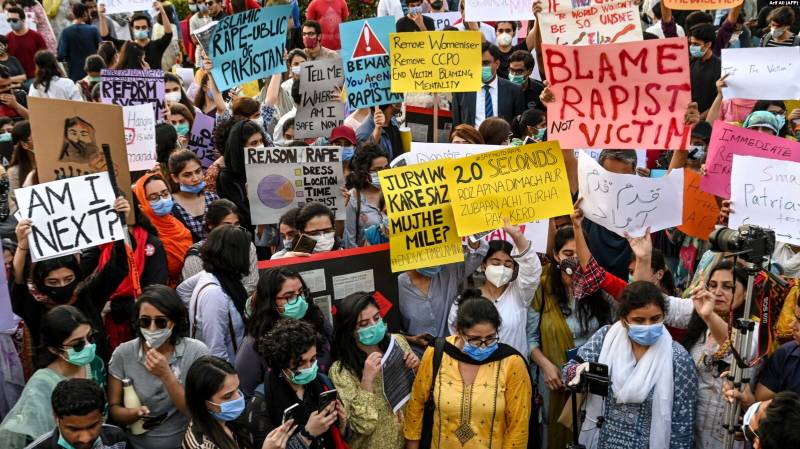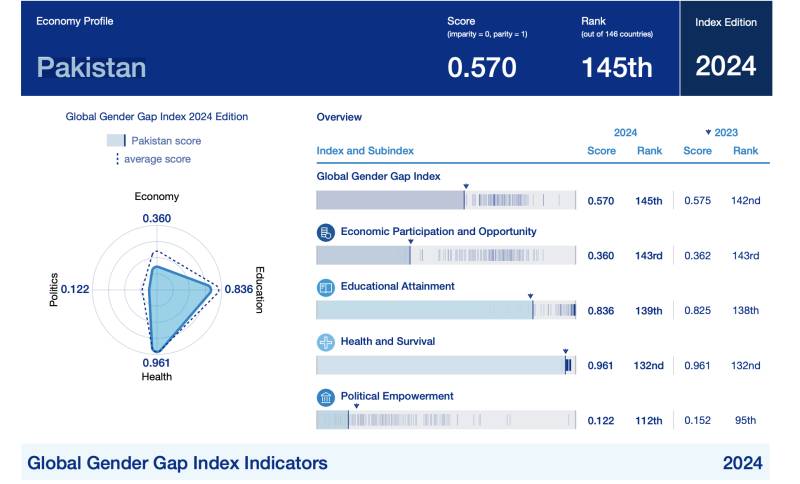
The issue of sexual violence, particularly rape, is a distressingly rampant problem in Pakistan. According to the Sustainable Social Development Organization report (2023), Lahore and Faisalabad reported high incidents of violence against women. As many as 10,201 cases of violence and 6,624 rape cases were reported during 2023. The report also noted that on average, 28 women faced some form of violence every day in Punjab. Similarly, in Sindh, as per the police data, there were 165 reported cases of rape and sexual assault in 2023.
Again, these are reported cases, the number of unreported cases is certainly higher due to the forced silence of the victims and their families, citing the damage to their reputation as the main reason. It is also true that many rape victims do not have the financial resources to fight the corrupt and patriarchal system of justice in Pakistan. Nonetheless, the number of reported cases should warrant urgent attention of the state authorities regarding high prevalence of gender-based violence. For police record and media reports, rape or domestic violence victims are just numbers, but to any person with a conscience, these are innocent lives, whose dignity, freedom and right to choose are vehemently violated. Consider the trauma, agony, and pain of women who endure such brutality and often lose their lives due to extreme torture and sexual violence.
In July 2024, a woman was coerced and gang-raped in the Hafizabad district, Punjab, in front of her husband and three-year-old daughter, by robbers at the gunpoint. It was reported that instead of asssiting the victim’s family, the police officials of the Hafizabad and Nankana Sahib districts reportedly clashed over the ‘dispute of jurisdiction’, completely disregarding the Standard Operating Procedures (SoPs) which were issued in the wake of the Lahore-Sialkot motorway gang-rape incident (2020) to respond to the sexual assault attacks on women.
- Pakistan was ranked 145th out of 146 countries in the 2024 World Economic Forum’s Global Gender Gap Index, further down from 142nd rank in 2023. Only Iran, Algeria, Chad and Afghanistan are below Pakistan.
In another incident in September 2024, a poor polio worker in Allah Bakhsh Jakhrani village in Jacobabad was raped while on duty. The Sindh government took serious notice of the case, and the survivor was provided protection and compensation. However, her husband drove her out of his house and snatched her three innocent daughters from her. The court had to intervene to reunite the victim with her daughters.

Pakistan was ranked 145th out of 146 countries in the 2024 World Economic Forum’s Global Gender Gap Index, further down from 142nd rank in 2023. Only Iran, Algeria, Chad and Afghanistan are below Pakistan. It is evident that gender equality is becoming a distant dream for us.
The conviction rate in sexual violence cases is less than 3% despite their prevalence. Like other incidents of gender-based violence, rape is a severally under reported crime in Pakistan because of the social stigma attached to the victim/survivor, victim blaming and shaming, and gender-insensitive environment at police stations, and courts. Many survivors do not come forward to report the case, and those who do, they and their families are mercilessly humiliated and dragged into our rotten criminal justice system. When it comes to legislation, Pakistan has come a long way from regressive Hudood Ordinance to progressive laws such as Women Protection Act 2006, Criminal Law (Amendment) (Offense of Rape) Act 2016, and Anti Rape Act (Investigation and Trial) 2020 and 2021. Accordin to the law, rape is a criminal offense in Pakistan and the punishment for rape is imprisonment or the death penalty; the imprisonment is for ten to twenty-five years. And in the cases of gang rape, the punishment is either life imprisonment or the death penalty.
The biggest problem is enforcement of the law, and tragically no one seems to care enough. In April 2024, the Lahore High Court had categorically ordered the federal government to ensure effective implementation of the Anti-Rape (Investigation and Trial) Act 2021 and protect the identity of the victims.
The law includes: establishment of special courts for rape cases through the country, the use of DNA testing and other scientific evidence, establishment of Anti-Rape Crisis cells, Special Sexual Investigation Units in every district, speedy trial proceedings, in-camera trial, legal assistance to the victims, distance recording of testimonies through video-conferencing, re-location of victims and witnesses. Moreover, it states that the victim/survivor’s identity can not be revealed even in court verdicts. It was maintained that judges should identify the victims using acronyms rather than full names.
The two-finger virginity testing for medico-legal examination of the survivor has been strictly prohibited in this Act. Justice Ayesha Malik in Lahore High Court and Justice Mazhar in the Sindh high court also banned the two finger virginity test. Unfortunately, the undignified and illegal practice is still being carried out in rape cases by medico-legal officers. Another important issue is the fewer number of medico-legal doctors and police surgeons - their role is crucial in establishing the physical evidence of rape. Delays in medical reports and lack of forensic laboratories fundamentally causes delay in investigation and filing of rape cases in court.
There should be specialised training of the police, medico-legal team, and judicial officers to sensitise them to the vulnerability of the victims.
Protection of privacy and confidentiality of the victim-survivor is essential, but sadly, while reporting cases in media and during the trial, there is always gross violation of privacy and identity of the rape survivors. India has strict rules for protection of identity and confidently of rape victims-survivors. During the recent case of the young doctor’s rape and murder at Kolkata Hospital, India, the victim’s identity was never revealed on mainstream, social or print media.
It is high time that the federal and the provincial governments must act immediately to implement the Anti-Rape Act 2021 and ensure that the necessary systems are in place at district level across the country. Rape is not just a crime against an individual, but it is a crime against the state, and the state must take the responsibility for making the society safer for women and girls. There should be specialised training of the police, medico-legal team, and judicial officers to sensitise them to the vulnerability of the victims. Law enforcement authorities and judiciary must ensure that the law acts with full force against any rape or sexual assault case across the country. These reforms can not be implemented by one department, it demands a multi-sectoral approach, political will and involvement of all members of the civil society.

